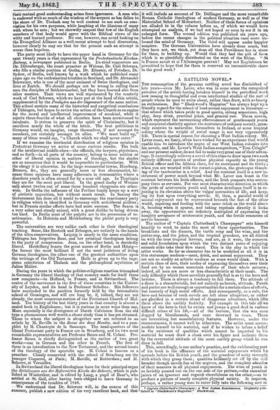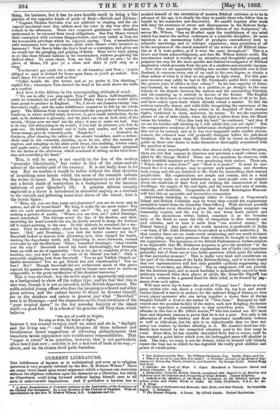A RATTLING NOVEL.*
THE consumption of the genuine rattling novel has diminished of late years—even Mr. Lever, who was in some sense the recognized patentee of the article having betaken himself in the periodical work now issuing to thoughtful and even intellectual studies of the sort of people whom he used to write about, rather than draw, with so hearty an enthusiasm. But " Blackwood's Magazine" has always kept up a friendly regard for the school of loud animal enjoyment in literature— that school which takes pride in good spirits strong sensations, high play, deep drink, practical jokes, and general row. These novels, which represent the unreasoning effervescence of gentlemanly youth and corporeal elasticity against the restraints of ordinary society, gene- rally contrive to naturalize themselves in Ireland, or some tropical colony where the weight of social usage is not very oppressively felt. There is special reason for choosing a West Indian colony. Mr.. Lever must, we fancy, often have wished for an experience that would enable him to introduce the negro of our West Indian colonies into his novels, and Mr. Lever's West Indian competitors, "Tom Cringle" and our present author, do not fail to make verygreat use of their advan- tage. It exceedingly relieves a novel of this class to draw upon two such entirely different species of profuse physical capacity as the young British officer and the African slave, for its merriment and its tricks;. when you are wearied with the cornet-h-piston, the grotesque thumb- ing of the tambourine is a relief. And the contrast itself is a new in- strument of power much beyond what Mr. Lever can boast in the contrast between his Irish officers, and the Irish peasants who accom- pany them as servants. For one most characteristic direction in which the pride of aristocratic youth and impulse developes itself is in re- joicing in its elevation above the vulgar necessities of life, and keep- ing its foot upon everything servile. If, then, a parallel world of animal enjoyment can be represented beneath the feet of the other world, capering and feeding with the same relish as the world above it, bending when it spurns, and taking reprisals directly it looks. away, the opportunities are infinitely multiplied of expressing the haughty arrogance of aristocratic youth, and the fertile resources of servile humour.
The author of "Captain Clutterbuck's Champagne" sets himself heartily to work to make the most of these opportunities. The breakfasts and the dinners, the turtle soup and the wine, and the porter-cup, and the jokes, and the tropical grandeur, are all dilated on with the true tropical fervour, and are, as it were, the common and solid foundation u distinct which the two distct races of enjoying animals alike take their firm stand. This is the day in which the artist works. So far as character has to be modelled at all it is in this statuesque medium—meat, drink, and animal enjoyment. They are not so muddy an artistic medium as some would think. With a certain class of men, their modes of expressing themselves over their food are by no means uncertain indicite of their whole natures; indeed, all men are more or less characteristic at their meals. The only difficulty which these novelists generally feel is as to the hero and heroine. There is always a tendency to fad there. The attitude of a diner is a characteristic, but not entirely an heroic, attitude. Punch and porter are well enough as opportunities for a certain class of effects, but scarcely of high moral effects. And consequently, as a rule, the hero and heroine of such novels are left alone altogether, or rather are glorified in a certain cloud of dangerous adventure, which lifts them above the earthly festivity. For example in this tale all we know of the hero is that he swims and jumps a good deal in various difficult crises of his life,—all of the heroine, that she was once dogged by bloodhounds, and once drowned in tears. These are interesting but unsatisfactory features. However, under the circumstances, it cannot well be otherwise. The artist must accom- modate himself to his material, and if he wishes to infuse a belief in the existence of qualities which, cannot be imparted to his material he must draw a cloak over his figure and indicate them by the reverential attitude of the more earthly group which he can draw in full.
This, accordingly, is our author's practice, and the exhilarating part of his book is the affluence of the material enjoyments winch he spreads before his British youth, and the grandeur of noisy strength with which they grasp them; qualities brilliantly set off by the still broader though servile fun of the negroes, and the complete abandon of their manners in all physical enjoyments. The wine of youth is so lavishly poured out on the one in& of the picture,—the succulent juices of an ignorant and roguish cheerfulness on the other,—as to produce a picture of nearly complete physical satiety. It requires, perhaps, a rather young man to enter fully into the following sort oi
*Captain Clutterback's Champagne; a West /adios Reminiscence. Orighially pub- lished In "Blackwood's Magazine." Blackwood..
thing, for instance, but it has its own humble merit in being a fair picture of the opposite kinds of pride of flesh—British and African:
"Captain Thomas Gervaise was not addicted to singing, and the ad- vanced bacchanal next him seldom used his voice in any way after five o'clock in the afternoon. These two respected gentlemen were therefore understood to be excused from vocal obligations. But Pat Shane viewed their exemption with extreme disapprobation, and even railed at Tom for the honourable privilege which he enjoyed, saying, 'Tom, y'unmelodious ould monument, how can ye remain silent when there's every incintive to harmony? Your face is bike the lion's head on a waterpipe, and gives oat no sound but the gurgling and gulping of fluids. Here we've been piping to ye like them blessed babbles in the marketplace, without projuicing the desired effect. Ye must chant, Tom, me boy. I'll tell ye now ; be the ghost of Moses, I'll give ye a chine new shirt if yell sing us a song.'
Yon haven't got credit for a shirt in all Jamaica,' said Tom ; you're obliged to send to Ireland for home-spun linen, or you'd go naked. You don't fancy I'd wear such stuff as that.' "Calico houlds the dirt better, and so ye prefer it, I'm thinking," replied Pat ; -whereupon Tom showed the head of his stick above the table as a caution.
And here is the African in the corresponding attitude of mind :
"No use to offer you pine-apple, Tom ?' said c'llnox, half-inquiringly, while he wrenched the tuft off a beautiful Ripley that a duke would have been proud to produce in England. No, I never eat Jamaica turnip,' was Gervaises reply ; and the same indifference seemed to be felt by the whole party. The delicious fruit became afterwards the perquisite of Gonsalvo de Cordova, to whose morbid mind, however, it gave small satisfaction, for he said, as he slobbered it gloomily, and the juice ran out at both sides of his mouth, 'S'pose now me mue eat dis pine ; it sure to make me bad. Dat is de way wid ebberyting in dis world; if you hab de pleasure, you hab de pain too. De lubliest mornin' end in 'torm and tunder, and de number
leven mango give de 'tummick-ache. Heigh-ho!' Gonsalvo de Cordova, after clearing the tables of the second breakfast, made a melan- choly meal in the verandah, standing up as he ate, after the- manner of negroes, and mingling on his plate pork chops, rice pudding, lobster salad, and apple-sauce; after which sad repast he felt in some degree prepared for the duties of the afternoon, which consisted of sitting on the back door- step and scratching his head."
This, it will be seen, is not exactly in the line of the modern "muscular Christianity," but rather in that of the cakes-and-ale school of the earlier part of the century. It is not badly done in its way. But we confess it would be better without the faint sketches of something more heroic which the sense of the romantic induces the writer to insert. Even the Negro department is not let off with- out a heroic shade of martyrdom as a background to the luscious indolence of poor Quashee's life. A genuine African recently captured in a slaver is introduced in sorrowful majesty as a contrast to the volatile and jabbering home-bred slaves of the island; here is the heroic figure : " Dere, sar, you see dem yams and plantains ? you see de cocos and de ackees, and all de bread kind! My king, it make for me snout water ! You eber see such probision-ground as dat, sar?" Ye, ye,' said Snowball, making a gesture of assent. 'Where you see dem, sar ?' asked Domingo, much astonished. The African noted the line of his shadow, and then, stretching his hand towards the sea, he slowly moved it along the horizon till it rested pointing to the east. In this attitude he remained for a mo- ment. Then he smiled sadly, shook his head, and laid the hand upon his heart. Hei,' said Domingo ; you tink dat better country nor dis ?' Snowball looked to heaven with glistening eyes, then clasped his hands, making the dog-chains rattle, and, forgetting to move forwards, seemed overcome by sad recollections. 'Chaw,' remarked Domingo ; what trouble you dis way ?' Snowball waved his hand deprecatingly, but Domingo went on with an air of superiority. Yon is too apt to complain of for you troubles, sar; you don't take no count of de blessin' you hab !' Only a sorrowful, inquiring look from Snowball. Yon no got Tablish Church an' faitful meenistars ? You no got libberl law and constitooshin ? You no free? Hei!' Though Snowball did not understand much of this grave reproof, his passion was now abating, and he began once more to move on composedly, to the great satisfaction of his eloquent instructor." This is very elevated; but the noble negro is apparently only meant as a background to show off the vulgar type : and we fear that this is also true, though it is not so intended, in the British department. The noble-minded young officer who does the jumping overboard and other great actions, and the radiant beauty to whom he devotes himself, are to the drinkers and eaters in general just what "Snowball" here is to Domingo,—and the rhapsodies on the fresh loveliness of the "pure tropical dawn" to the hot noonday festivity of the island itself,—a good foil. It is a book of the genuine old Tory class, which believes
"the eye of youth so bright, Its step so firm, its heart so light,"
because it was created to enjoy itself on cakes and ale in "daylight and the living sun :"—and which despises all those toilsome and troublesome moral suggestions of reforming philanthropists that transform lavish enjoyments into troublesome responsibilities. That "sugar is sweet" is an assertion, however, that is not particularly often heard just now ; and this is not a bad sort of book in its way ;— clever, and on its chosen level quite harmless.































 Previous page
Previous page